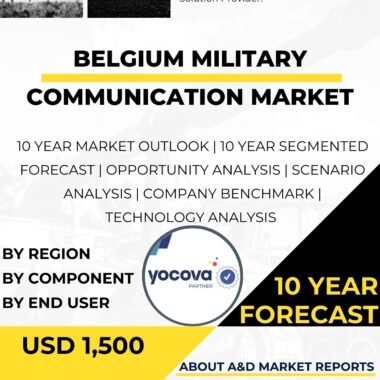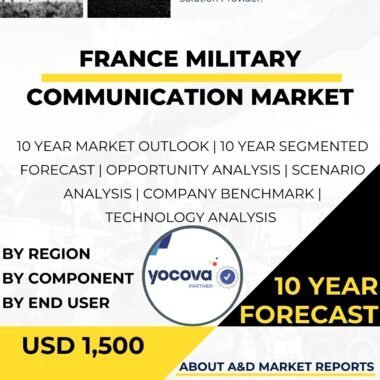Description
Germany military communication market has been a critical and evolving segment within the country’s defense industry. Military communication plays a pivotal role in enabling effective command, control, and coordination of forces, as well as ensuring secure and reliable information exchange on the battlefield. In an era of rapidly evolving threats and complex security challenges, robust and efficient military communication systems are essential to maintaining a modern and capable armed forces.
The Germany military communication market encompasses a wide range of technologies, equipment, and services designed to meet the specific communication needs of the country’s armed forces. These communication systems are employed across various branches of the military, including the Army, Navy, Air Force, and Joint Special Operations Command, to ensure seamless information flow between units and enable real-time decision-making.
One of the primary drivers of the Germany military communication market is the ongoing modernization and digitization efforts by the German Armed Forces. As part of its military reform agenda, Germany has been investing in upgrading its communication infrastructure and acquiring advanced communication systems. These efforts aim to enhance the connectivity and interoperability of military units, enabling more effective joint operations and collaboration with allied forces.
Furthermore, Germany’s participation in various international missions and peacekeeping operations necessitates robust and reliable communication capabilities. Military personnel deployed in remote or hostile environments require secure and efficient communication links to stay connected with their command centers and fellow troops. Therefore, the demand for advanced military communication systems that can withstand challenging operational conditions is significant.
The Germany military communication market is also influenced by technological advancements in communication technologies. The adoption of modern communication technologies, such as satellite communication, software-defined radios, tactical data links, and cybersecurity solutions, has transformed the way military units communicate and share information. These advancements have increased the effectiveness and efficiency of military communication while ensuring the protection of sensitive data from cyber threats and unauthorized access.
Moreover, the increasing integration of network-centric warfare concepts in military operations has amplified the importance of military communication systems. Network-centric warfare relies on the rapid exchange of information between various units and platforms to achieve a shared understanding of the battlespace and gain a competitive advantage over adversaries. Robust and secure communication systems are essential to enable this information-sharing capability and enhance the military’s overall situational awareness and operational effectiveness.
In recent years, Germany has also shown a growing interest in exploring and adopting cutting-edge communication technologies, such as fifth-generation (5G) communication networks. 5G technology offers higher data transfer rates, reduced latency, and increased connectivity, making it potentially transformative for military applications. However, the integration of 5G technology into military communication systems also presents unique challenges related to spectrum management, cybersecurity, and standardization.
The export potential of German military communication systems is another important aspect of the market. Germany’s reputation for producing high-quality defense equipment and its strong technological base make it an attractive supplier for other countries seeking advanced military communication solutions. However, export decisions are subject to international regulations and political considerations, particularly when it comes to sensitive military technologies.
Challenges faced by the Germany military communication market include the need to balance investments in communication systems with other defense priorities, given budget constraints. The modernization of military communication infrastructure requires substantial financial resources, and decision-makers must carefully prioritize investments to achieve a balance between communication capabilities and other critical defense needs.
Additionally, the Germany military communication market must address the evolving cyber threat landscape. As military communication systems become more reliant on networked technologies and data exchange, the risk of cyber-attacks and information breaches increases. Ensuring the resilience and cybersecurity of military communication systems is a critical aspect of modern defense planning.
In conclusion, the Germany military communication market is a vital and evolving segment within the country’s defense industry. Robust and efficient communication systems are essential for effective command and control of military forces, enabling real-time decision-making and collaboration among units. The market is driven by Germany’s military reform agenda, participation in international missions, technological advancements, and the adoption of network-centric warfare concepts. As Germany continues to invest in modernizing its military communication infrastructure and exploring cutting-edge technologies, the market is expected to play an increasingly pivotal role in the country’s defense capabilities and international defense cooperation efforts.




